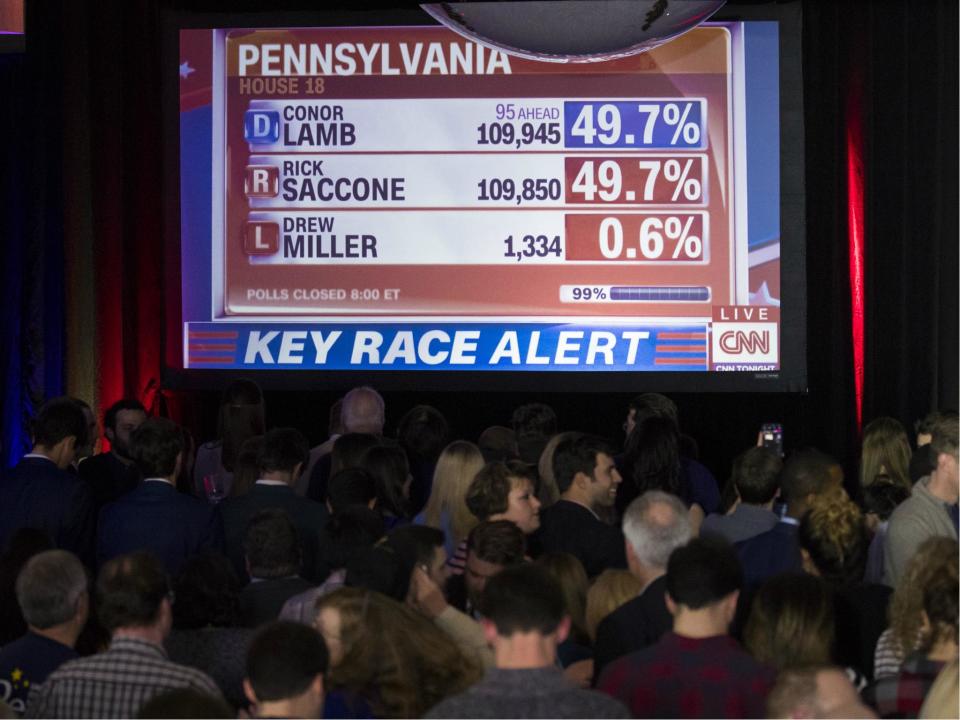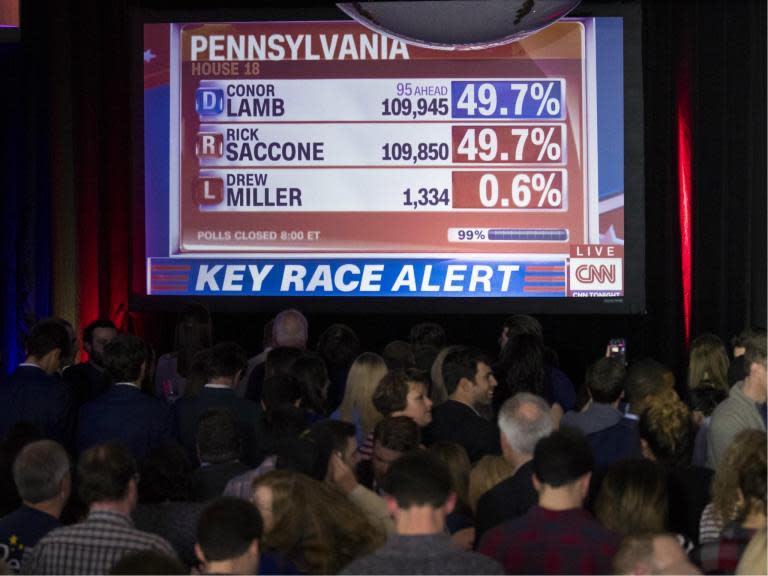Pennsylvania special election: Republicans scramble to explain damaging result against Democrat Conor Lamb
Republicans are struggling to explain what could be an embarrassing result in a Pennsylvania congressional race between Democrat Conor Lamb and the Donald Trump-backed Rick Saccone – in a district the President won by 20 points in 2016.
In a stunning show for Democrats, after absentee ballots were counted Mr Lamb is 627 votes ahead out of slightly more than 226,000. Military and an unknown number of provisional ballots are still being counted, but essentially 100 per cent of votes are in.
Mr Lamb, a first-time candidate and former prosecutor, was declared the “apparent winner” by NBC News and gave a sort of victory speech early on Wednesday morning, but an official announcement has not been made as yet. A recount or a legal challenge are possible.
“It took a little longer than we thought, but we did it. You did it,” Mr Lamb told cheering supporters. However, before his rival claimed victory Mr Saccone told his supporters: “It’s not over yet... We’re going to fight all the way to the end.”
Mr Saccone and Mr Lamb are competing for the seat vacated by Republican representative Tim Murphy, who resigned amid a personal scandal in October. The Pennsylvania 18th district as it is currently defined will not last past the midterms in 2018 – the current map was recently struck down for being biased towards Republicans. But the race remains a powerful symbol of what could happen in the November midterms – with Republicans trying to hold onto majorities in both chambers of Congress, the House and the Senate.
Mr Saccone was blessed with the full force of the White House in the weeks before the election, making appearances with everyone from Vice President Mike Pence to President Trump’s son, Donald Jr. That is indicative of the race’s importance, at least for momentum and moral.
House Speaker Paul Ryan attempted to explain the phenomenon by calling the special election a race between “two conservatives”, and painted Mr Lamb as “pro-life, pro-gun, anti-Nancy Pelosi [House Minority Leader] conservative”. Privately, though, Mr Ryan was far less optimistic and he is said to have warned colleagues that however slim Mr Lamb’s lead is, the election results should serve as a “bit of a wake-up call” for the party. Mr Ryan is pushing his party to fundraise and fight, even in reliably conservative districts for the November 2018 midterm elections.
Whether Mr Lamb, a 33-year-old Marine captain from a political family, wins the seat or not, it is a blow to Mr Trump, who endorsed Mr Saccone, a former diplomat to North Korea. The President swept into Pennsylvania with one of his semi-regular “Make America Great Again” rallies on Saturday, looking to give Mr Saccone a boost. Mr Trump promised that if Mr Saccone was put into the House, he would “vote for us all the time”.
As for Mr Saccone, the 60-year-old university professor and air force veteran had clearly hitched his wagon to Mr Trump’s star power, having previously claimed he was the region’s Mr Trump “before Trump was Trump”.
“I ran on that agenda in 2010. It’s the same agenda – it’s the people’s agenda. The President just nationalised it,” he said to a local Pittsburgh radio station, referring to his priorities of repealing and replacing Obamacare, reducing government spending, increased support for the military, and protecting the Second Amendment.
Mr Saccone has won over many of the more rural counties that border West Virginia, but Mr Lamb won the more populated and suburban Allegany county, which was enough to give him the smallest of leads. The district, encompassing suburban and rural areas around Pittsburgh in four counties, has been so reliably Republican in recent elections that Democrats have sometimes failed to even field a candidate in past years.
The election, even if not a win for the Democrats, is an embarrassment to Mr Trump, having previously backed defeated Alabama Senate candidate Roy Moore. The President wholeheartedly endorsed the 71-year-old Mr Moore during that special election last year, even after several women came forward to detail alleged sexual misconduct and harassment by the former district attorney when he was in his thirties and they were teenagers. Mr Moore denied all the allegations made against him.
The scandal ultimately brought out voters to place Doug Jones in the seat that had not seen a Democrat in more than 25 years.
“Steel is back,” Mr Trump had repeatedly claimed at his weekend rally, an important slogan for the region once dominated by steelworkers. He touted it to show voters in the district that his administration’s 25 per cent tariff on imported steel would be a way to help them, despite the near-universal criticism of the policy from Republicans and world leaders alike. Again, Mr Trump was found making the end of the campaign more about him than the man he was there to support.
However, the President’s claims are not indicative of the region’s employment and incoming companies, many of which are more focused on green energy and technology thanks, in part, to the influence of the nearest large city, Pittsburgh.
As with Alabama, this special election garnered millions of dollars in outside contributions and support.
Conservative groups spent upwards of $10m, according to the New York Times. In a sign of growing Democrat confidence, former Vice President Joe Biden, originally from Scranton, Pennsylvania, came out to support Mr Lamb as the contest neared its end.


